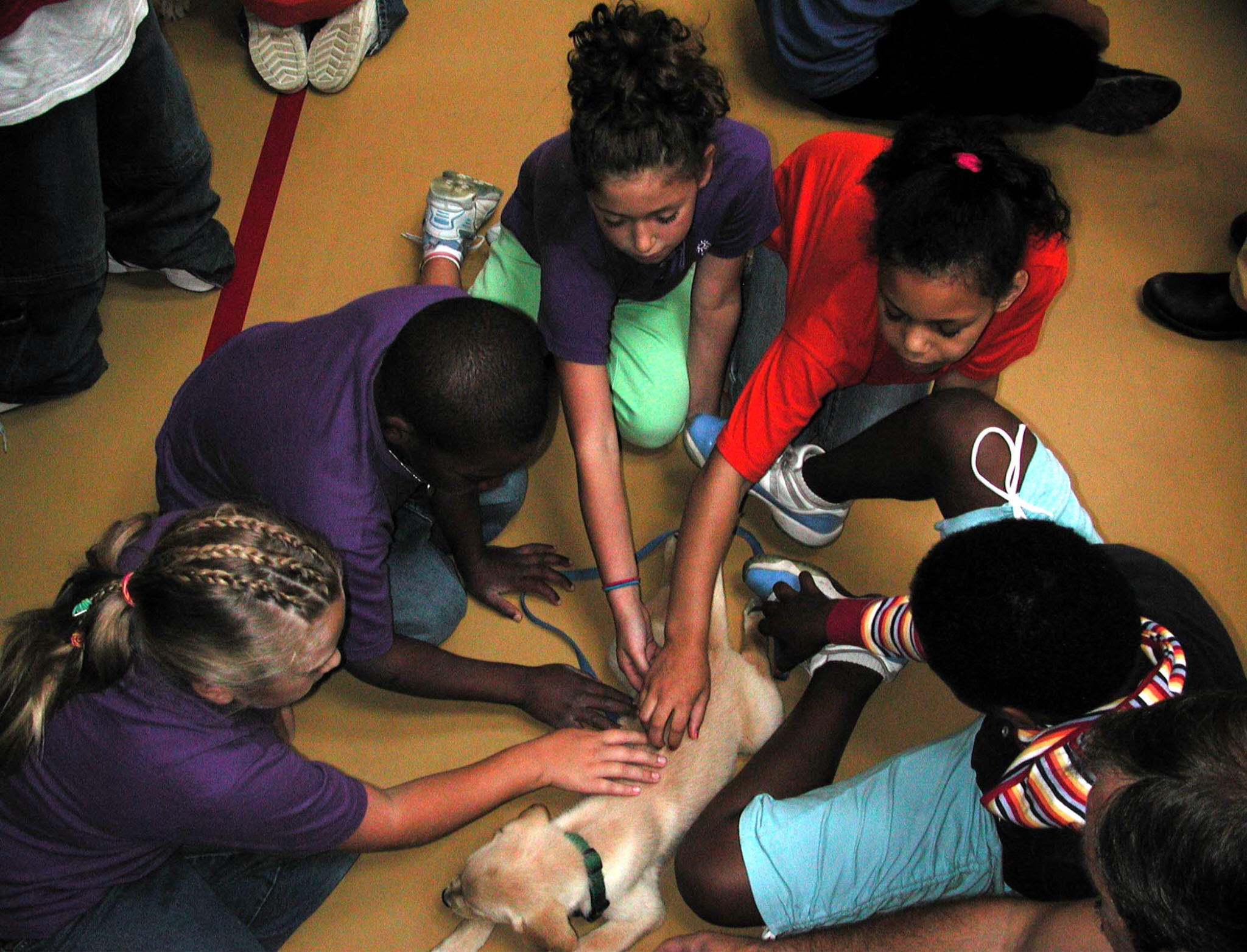April is Autism Awareness and Acceptance Month, bringing attention to and a better understanding of autism spectrum disorder (ASD).  Autism—a complex, lifelong developmental condition that affects one in forty-four children—is different for every individual. Many people with ASD have challenges with social skills,communication, relationships, and self-regulation. Yet, for many with ASD, autism Service Dogs can be an amazing link to a safe and expanded world.
Autism—a complex, lifelong developmental condition that affects one in forty-four children—is different for every individual. Many people with ASD have challenges with social skills,communication, relationships, and self-regulation. Yet, for many with ASD, autism Service Dogs can be an amazing link to a safe and expanded world.
The Life-Changing Impact of Autism Service Dogs
A young child walks through a crowded store tethered to his Service Dog, who helps him stay with his family and remain calm in a crowd. A young child confidently communicates with her classmates to introduce them to her Service Dog. A mother can now relax knowing that her child’s autism Service Dog will keep her child from darting into traffic. Those are just a few examples of the many ways autism Service Dogs can make an enormous difference in the lives of people with autism and their families.
Although no sleight of hand, illusions, spells, or potions are involved, many families believe Canine Magic, a specialized Educated Canines Assisting with Disabilities (ECAD) program, is indeed magical.

With the help of a Service Dog trained specifically for the struggles of each child with ASD, countless families have witnessed life-altering changes in their children.
For example, Lisa Golunsinski shared how her son Leo’s Service Dog, Champion, has transformed their lives. Like many children with ASD, Leo finds social interactions challenging.
“On our first walk around the neighborhood, Leo looked right up at a group of children and said, “Would you like to meet my dog?” At that moment, I could see him beaming with confidence! That may not seem like a big deal, but this mama’s heart has never been happier, more proud, or truly relieved.”
What the Scientific Research Says
There is a lot of anecdotal evidence that autism Service Dogs benefit children with autism; however, research on the value of Service Dogs is limited but growing. For example, one study highlighted social interaction as the most apparent outcome of an autism Service Dog. Another study, the Purdue Canines for Autism Research Study, launched in 2019, explores Service Dogs' therapeutic effects on children with ASD and their caregivers.
Who Qualifies for an Autism Service Dog?
Anyone with a medical diagnosis of autism or autism spectrum disorder may qualify for a Service Dog, depending on their needs. Most organizations training and placing autism Service Dogs focus on matching dogs to families with autistic children.
How Service Dogs Help With Autism
Characterizations of ASD include impairments in communication skills and social interaction, and sometimes challenging behaviors. Autism Service Dogs can be life-changing partners, helping their human companions navigate the world in many different ways.
Anchoring or Tethering
An immense concern for many parents is the safety of their child with autism. The anchoring or tethering method attaches a child’s belt to a harness worn by the dog. In addition, the child learns how to walk with the dog holding the harness, while a third party (a parent) holds a second leash attached to the dog’s collar. Anchoring or tethering prevents a child from wandering or bolting away from their parents while giving them a bit more independence.
Increased Social Interaction
Social interactions are critical in cognitive and linguistic development. Unfortunately, for many children with ASD, social interactions with others are challenging, leading them to withdraw and isolate themselves. Autism Service Dogs can act as social facilitators. They can be a magnet to other children, making them want to interact with the dog and offering a social “bridge” for children who are often excluded by others because of their behavior or lack of social interaction.
Tactile Stimulation
Overstimulating situations may cause some children with ASD to engage in repetitive self-stimulating behaviors that can often be damaging. For example, a child might pick at their skin, repeatedly hit their head, make verbal repetitions, etc. Autism Service Dogs can be trained to nudge or paw at a child to focus their attention on their dog rather than whatever may be upsetting them.
Autism Service Dogs take companionship to the next level, with life-changing physical, intellectual, and emotional support. For people with ASD, Service Dogs may mean the difference between a life of isolation and a life of engagement.
Help Us Change the Lives of Children with ASD
As Leo’s mother, Lisa Golusinski, shared, “I can’t tell you how many people along the way have asked what a Service Dog can do for a child with autism. And, I have learned that the question should really be, what can’t it do?”
It’s nearly impossible to fully explain the impact of Service Dogs for a person with ASD or any disability. Service Dogs keep people with disabilities safe, making it possible to lead independent lives. Breeding, nurturing, and training Service Dogs has many associated costs, but the results are priceless, and your gift makes an enormous difference.
